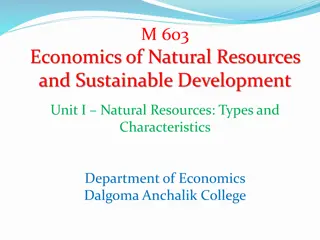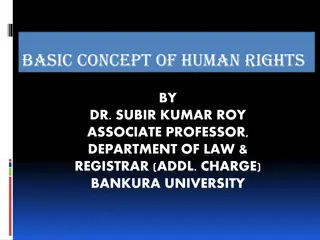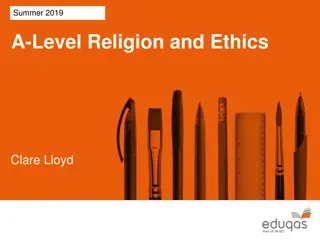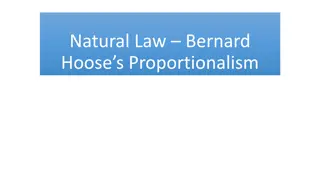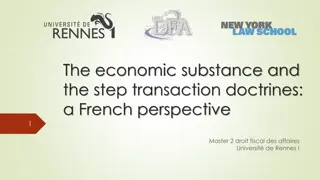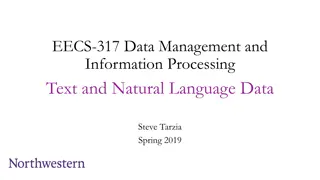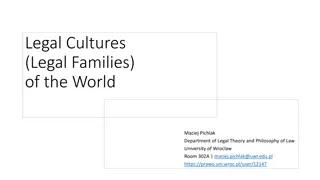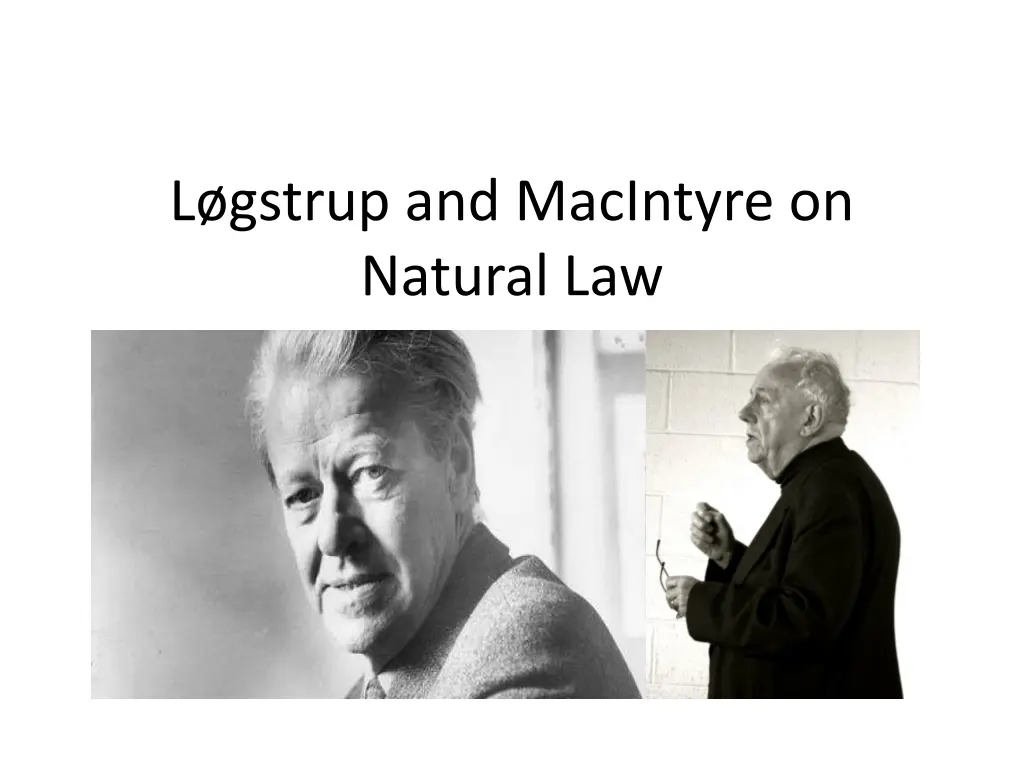
Insight into Lgstrup and MacIntyre on Natural Law
Explore the debate on Lgstrup's classification as a natural law theorist, analyzing MacIntyre's contrary stance and uncovering valuable insights on diverse forms of natural law theory. Delve into the essence of natural law theory, examining its normative ethical foundation, and distinguishing between theistic and non-theistic perspectives to understand ethical normativity better.
Download Presentation

Please find below an Image/Link to download the presentation.
The content on the website is provided AS IS for your information and personal use only. It may not be sold, licensed, or shared on other websites without obtaining consent from the author. If you encounter any issues during the download, it is possible that the publisher has removed the file from their server.
You are allowed to download the files provided on this website for personal or commercial use, subject to the condition that they are used lawfully. All files are the property of their respective owners.
The content on the website is provided AS IS for your information and personal use only. It may not be sold, licensed, or shared on other websites without obtaining consent from the author.
E N D
Presentation Transcript
Lgstrup and MacIntyre on Natural Law Robert Stern
Aim I want to claim that L gstrup is a natural law theorist But MacIntyre denies that L gstrup is a natural law theorist So I will argue that MacIntyre is wrong, but in a way that tells us something interesting about the forms that natural law theory can take
Structure 1. Why think L gstrup is a natural law theorist? 2. Why does MacIntyre deny that L gstrup is a natural law theorist? 3. Why MacIntyre is wrong 4. Lessons learnt
Lgstrup as a natural law theorist What is natural law theory? Answer: There is a normative ethical structure grounded in the nature of our lives and what it takes for them to go well, where the normativity of that structure does not come from us as individuals or collectively through our desires, self-legislating reason or law-making, or from God in the role of commander Rather: structure is needed to enable proper functioning of our lives, and gets its normativity from that
Lgstrup as a natural law theorist Cf. Mark Murphy: The natural law theorist thus explains the moral law and its features ultimately by appealing to facts about human nature and its defective and nondefective realization. The natural law applies to all that share this common nature. Its normativity flows from the goods that fulfill our natures, and its objectivity from the status of these goods as matters of natural fact. And the determinate content of the moral law that certain kinds of action are ruled out, and others not is fixed by the particular goods that fulfill us. That one is a human being, for whom life is good, necessitates everyone s refraining from murdering, mutilating, or assaulting him or her the good of life entails that any action that is opposed to one s good in this way is ruled out, as a defective response, as a bad sort of action. The explanation runs from the nature of the good to the inevitable badness of certain responses to that good, and thus to the necessity of agents not performing such actions.
Lgstrup as a natural law theorist But can distinguish between two kinds of natural law theory: (a) Theistic: The world only has this normative structure because world created by God so God still involved, though not as commander (b) Non-theistic: The world has that structure independently of being created by God Basic issue for natural law theory: does it do enough to explain ethical normativity, especially if it takes non- theistic form? Response: by offering further explanations, other theories make things worse rather than better wiser to stop digging
Lgstrup as a natural law theorist I suggest that L gstrup best seen as a natural law theorist May seem wrong, as L gstrup doesn t actually call himself a natural law theorist in his published writings (though he does in a note to his dissertation) The label he most often uses is ontological ethics , which he contrasts to teleological ethics and deontological ethics And in one place he seems even to reject natural law theory but will come back to that
Lgstrup as a natural law theorist Nonetheless, still makes sense to read L gstrup as a natural law theorist: We are vulnerable and dependent creatures That vulnerability and dependency gives us power over one another, so that we hold the life of other people in our hands We are under an obligation or demand to use that power for the good of others, rather than their ill That demand is silent, radical, one-sided and unfulfillable, and have to right to make the demand
Lgstrup as a natural law theorist What makes this a natural law theory? Murphy: The explanation [of normativity] runs from the nature of the good to the inevitable badness of certain responses to that good, and thus to the necessity of agents not performing such actions . L gstrup: Your life is a good, which I have in my hands, where it would be bad to respond by failing to care for your life, so I am under a demand to act accordingly So [Murphy] normativity flows from the goods that fulfill our natures, and its objectivity from the status of these goods as matters of natural fact . Contrasts with authority based views of normativity, which treat normativity as flowing from some source of command or authority, whether that is God, ourselves, or other people
MacIntyre on Lgstrup But MacIntyre denies that L gstrup is a natural law theorist: L gstrup rejected, and his position required him to reject, any conception of the natural law [MacIntyre s note: refers to p. 100 of ED], seeing it not only as part of a mistaken account of the authority of rules, but also as an inheritance from the metaphysical tradition which, following Heidegger and Lipps, he took to have been discredited.
MacIntyre on Lgstrup So MacIntyre makes three claims in support of his reading of L gstrup: Reference to p. 100 of The Ethical Demand L gstrup rejects the authority of rules L gstrup rejects the metaphysical tradition
MacIntyre on Lgstrup Consider each in turn, beginning with textual reference to ED p. 100 Comes in 7 of Chapter 4, where L gstrup is considering the changing character of social norms , and the threat of relativism this might seem to pose
MacIntyre on Lgstrup We know from history that our mutual relationships, both in the family and in the political sphere, and their institutions and norms are constantly undergoing change. Their content is relative. Does this mean that everything is tottering? Many people assert this to be the case. It is obvious, they say, that what is good in one period is bad in another and this fact destroys the difference between good and evil. How can there be anything obligatory about the good, they ask, if that good is something that is only good today in contradistinction to what was good yesterday and what will be good tomorrow?
MacIntyre on Lgstrup L gstrup then suggests that this worry leads people towards a form of natural law theory: They believe that a relativization based on the historical evidence attesting the changeableness of morality and order can only result in the dissolution of morality and order. And they think that the only alternative is an unchangeable structure in our particular mutual relationships and their institutions. It should be possible, they say, to distinguish between that which changes and that which is eternal in the orders of family and political life. This is the old question of the difference between lex naturae and lex positiva. By attempting to tie in with the metaphysical tradition in western European culture they hope to clear up the mess into which the relativization threatens to plunge us.
MacIntyre on Lgstrup But L gstrup rejects this solution to the problem of relativism: Argues it is addressing an issue that is imaginary , as it can be resolved another way without appealing to the distinction between lex naturae and lex positiva - which MacIntyre interprets as a rejection of the natural law tradition as such
MacIntyre on Lgstrup But is MacIntyre right? No: because L gstrup just rejecting a view of natural law that tries to stave of relativism by finding something eternal in the orders of family and political life where L gstrup thinks this project is hopeless and unnecessary But he is not rejecting a more general form of natural law, which treats the ethical demand as fixed, even thought the various forms in which it may manifest itself at the family and social level may vary So problem is not with natural law as such but natural law that operates at the wrong level
MacIntyre on Lgstrup Cf. ED, p. 102: It is self-evident that exploitation of the other person today is not one whit less evil just because one knows that two hundred years ago they had a different conception of the love relationship than we have today Generally speaking, the difference between what is good and what is evil in my relation to the other person is and remains absolute, regardless of how relative the norms may be which determine what is good and what is evil
MacIntyre on Lgstrup So L gstrup is a natural law theorist, but not at level of social practices like marriage, property and political institutions So L gstrup would reject much of so-called new natural law theory as proposed by Grisez, Finnis and others because it tries to operates at this level But this still does not mean he is not a natural law theorist at all. And by operating as a natural law theorist at the level of the ethical demand, and not social norms, L gstrup may avoid the difficulties they face
MacIntyre on Lgstrup Turn to MacIntyre s second claim: L gstrup rejected natural law tradition because he saw it as part of a mistaken account of the authority of rules - whereas the natural law theorist thinks they can come up with a pretty determinate list of laws based on claims about human nature, which we are then required to follow qua laws
MacIntyre on Lgstrup MacIntyre right that L gstrup rejected idea of fixed moral rules, and idea that we should be motivated by law or duty But the ethical demand is still a general principle: the demand says that the other s life should be cared for in a way that best serves the other (p. 55, translation modified) - but requires attention to the particular to follow it And motivation to follow it does not come from the fact it is a law, but that by following it one will best serve the other person
MacIntyre on Lgstrup But MacIntyre might argue that this still leads to a divergence from natural law, on his account of natural law? = law gets its justifying and motivating reason from fact it leads to the common good, which in turn benefit us individually Why then should each of is, as rational agents, accept the constraints of the natural law? It is because only insofar as we are directed towards the achievement of the relevant set of common goods [such as family, school, workplace] not themselves reducible to individual goods are we also directed towards the achievement of our own individual good, the good of each of us qua human being. So runs the Thomistic account.
MacIntyre on Lgstrup L gstrup does think that our good as a community can only be achieved if certain norms are followed (such as trust, openness of speech etc) But would deny that the only reason to accept these norms is the achievement of our own individual good , as makes the relation too instrumental Motivation needs to come from concern for the other But not clear that natural law theory has to take this Thomistic form? Though L gstrup does think that acting in accordance with others leads to our self-realization but this isn t what provides us with reason to act
MacIntyre on Lgstrup Turn to MacIntyre s third claim: L gstrup rejects natural law because he sees it as an inheritance from the metaphysical tradition which, following Heidegger and Lipps, he took to have been discredited . Cf. ED, p. 100: By attempting to tie in with the metaphysical tradition in western European culture [proponents of lex naturae] hope to clear up the mess into which the relativization [of social norms] threatens to plunge us
MacIntyre on Lgstrup But depends what is meant here by metaphysics ? L gstrup himself elsewhere strongly rejects anti- metaphysical philosophy [i.e. various forms of scientific positivism] Cf. e.g. ED, p. 171, translation modified: The conflict with anti-metaphysical philosophy is and remains unavoidable. The demand which sets reciprocity aside [i.e. the ethical demand] cannot exit in the place to which it is assigned by anti-metaphysical philosophy
MacIntyre on Lgstrup So what metaphysical tradition in western European culture is L gstrup rejecting in the passage cited by MacIntyre? Suggestion: it is the Lutheran conception of social orders or ordinances (the household, state and church), which attempt to come up with fixed system of social norms based on a metaphysics of creation L gstrup rejects this aspect of Lutheran position: This order of things is not the same from people to people, or through all time. It is changeable. For even though it has its basis in the nature of human beings, as is obvious for example in the ordinance of marriage and the family, nonetheless we give these ordinances a determinate cultural form; they are therefore just as much determined by the characteristics of a people as by historical tradition. (KHE, pp. 96-97/KH, p. 88) But again, doesn t mean he rejects natural law at more fundamental level, and as an account of normativity
MacIntyre on Lgstrup So still accepts a natural law theory, which he still understands in broadly Lutheran terms: The ethical demand receives its content from the fundamental condition [grundvilk r] that we live under and which we are powerless to change, namely that the life of the one person is entangled with that of the other person, and so it consists in taking care of the part of the other person's life which as a result of this entanglement is at one's mercy. Nature (understood as the immutable basic condition) teaches what love does (Luther). The ethical demand is refracted as through prisms of all the different and particular relationships in which we stand to one other as spouses, parents and children, teachers and students, employers and workers, as they are all forms of the fundamental condition whereby the ethical demand gets its content. (EBP, p. 12)
Conclusion So, seen there is a complex relation between L gstrup and natural law tradition, but MacIntyre oversimplifies things by saying he rejected it: MacIntyre is right to claim that L gstrup s ethics is not one of applying rules does not seek to claim natural law status for many of our social practices, or to directly derive social norms from ethical norms does not seek to find the motivation for following the natural law in our underlying interests, or indeed to treat following a law qua law as a proper motivation at all the ethical demand itself does not relate to the common good in a Thomistic manner, for they relate to our interactions with individual others, not others as part of a wider community though by following them we do make that community possible does not tie natural law to the idea of natural rights, in a way that is common to many natural law theorists
Conclusion But still: L gstrup offers the ethical demand as a general norm, which is refracted in our more particular social practices Connects the realization of the ethical demand and sovereign expressions of life with our self-realization, so that in acting in light of them we are never more fully ourselves Offers an account of obligation that is in line with the natural law approach, where the normative force that resides in our relationship with others is taken to come from the power relations that arise from the way in which those lives are structured, and which bind us together as the creatures we are


